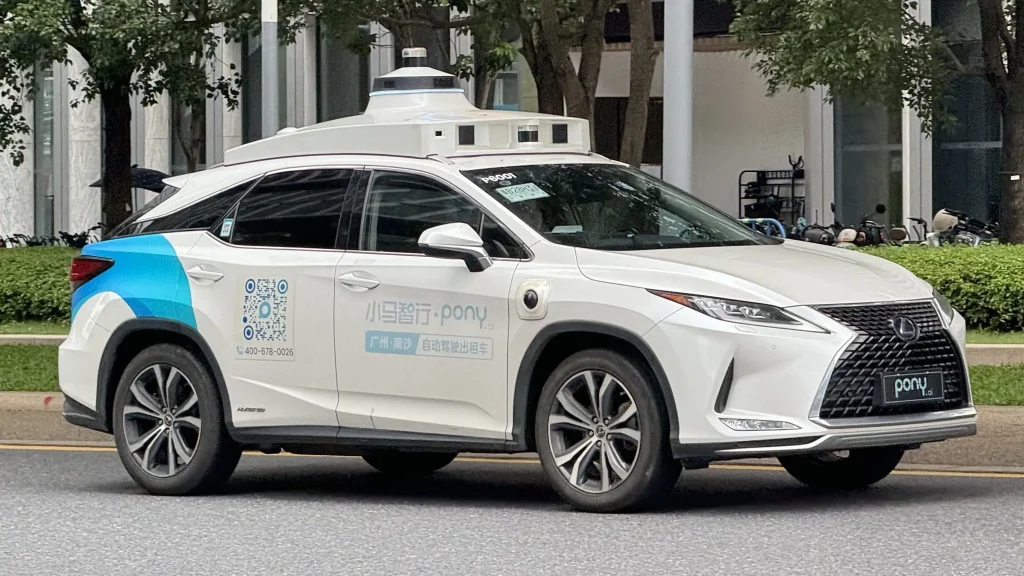China-based autonomous vehicle pioneer Pony.ai has acknowledged that escalating trade tensions between the United States and China could disrupt its ambitions for global expansion. Despite the challenges, the company remains confident that its core supply chain will withstand the geopolitical turbulence.
Pony.ai, which receives backing from Japanese automotive giant Toyota, disclosed on Thursday that the administration of former U.S. President Donald Trump — particularly its aggressive tariff policies — may negatively influence the firm’s international growth trajectory. These comments came shortly after the company’s successful $260 million fundraising effort via a Nasdaq listing in November, which fueled its ambitions to expand into markets such as South Korea, Luxembourg, and the Middle East.
Tariffs Create Uncertainty, but Core Supply Chain Holds Strong
Trump’s recent imposition of a sweeping 10% tariff on all other U.S. imports and a hefty 145% duty on Chinese goods has sent shockwaves through the global business environment. Many companies are now revisiting their global plans amid fears of rising costs and regulatory barriers. However, Pony.ai’s CEO James Peng offered a more tempered view during a media interaction at the Shanghai Auto Show.
“On the supply side, we always make sure to maintain alternative sources and backup options,” Peng told reporters. “We don’t expect a direct hit to our supply chain, but from a sentiment standpoint, these developments definitely influence our global expansion strategy.”
Chip Supply Secure with Nvidia and Chinese Alternatives
Pony.ai heavily relies on advanced autonomous driving chips, particularly Nvidia’s Orin-X and the forthcoming Drive Thor processors, for its robotaxi operations. Fortunately, these components remain outside the scope of current U.S. export restrictions to China. Peng noted that, while the company continues to use Nvidia’s offerings, it has already secured fallback options through domestic Chinese chipmakers in case of future policy shifts.
“It’s hard to imagine those specific chips getting restricted,” Peng said. “But we’ve built relationships with alternative suppliers in China just to ensure continuity.”
Silicon Valley Roots with a Global Footprint
Founded in 2016 in California’s tech hub of Silicon Valley, Pony.ai has grown into a multinational operation with R&D centers spread across China, the United States, and Luxembourg. Its technological capabilities and regulatory compliance have already earned it robotaxi licenses in several major Chinese cities, including Beijing, Shanghai, Guangzhou, and Shenzhen.
The company has also set its sights on Hong Kong. According to Peng, Pony.ai is actively working to bring its autonomous taxi services to the region. He hinted at the possibility of a secondary stock listing in Hong Kong, although the primary focus remains on ramping up production for the next generation of vehicles.
Production Ramps Up as Global Demand Grows
Pony.ai is now entering a critical phase in its manufacturing journey. The company has recently completed upgrades to its production lines to support mass production of its 7th-generation vehicles. Peng revealed that the company aims to deliver nearly 1,000 vehicles this year alone.
“Our entire assembly infrastructure is now configured for mass production,” Peng explained. “We anticipate a sharp acceleration in both vehicle output and market deployment over the next few years. Once demand stabilizes, we’re ready to scale into the tens of thousands.”
Trade Tensions Could Temper Global Ambitions
While Pony.ai appears well-positioned in terms of technology and supply chain readiness, the broader geopolitical landscape may still act as a brake on its global ambitions. Trade policies under Trump’s administration have injected a degree of uncertainty into cross-border business operations, especially for tech companies navigating U.S.-China relations.
Nevertheless, Peng remains optimistic. “We’re fully committed to global expansion, but we’ll need to be agile and responsive to the policy environment. The path forward won’t be linear, but we’re confident in our long-term strategy.”
Looking Ahead
Despite trade policy turbulence, Pony.ai stands out as a resilient and adaptable player in the fast-evolving autonomous driving sector. By securing diverse chip suppliers and expanding its operational footprint, the company is laying the groundwork for sustained international growth — even as it carefully watches the shifting political winds.
With its production capabilities maturing and services gaining traction in multiple cities, Pony.ai seems determined to drive its futuristic vision forward — one autonomous vehicle at a time.



